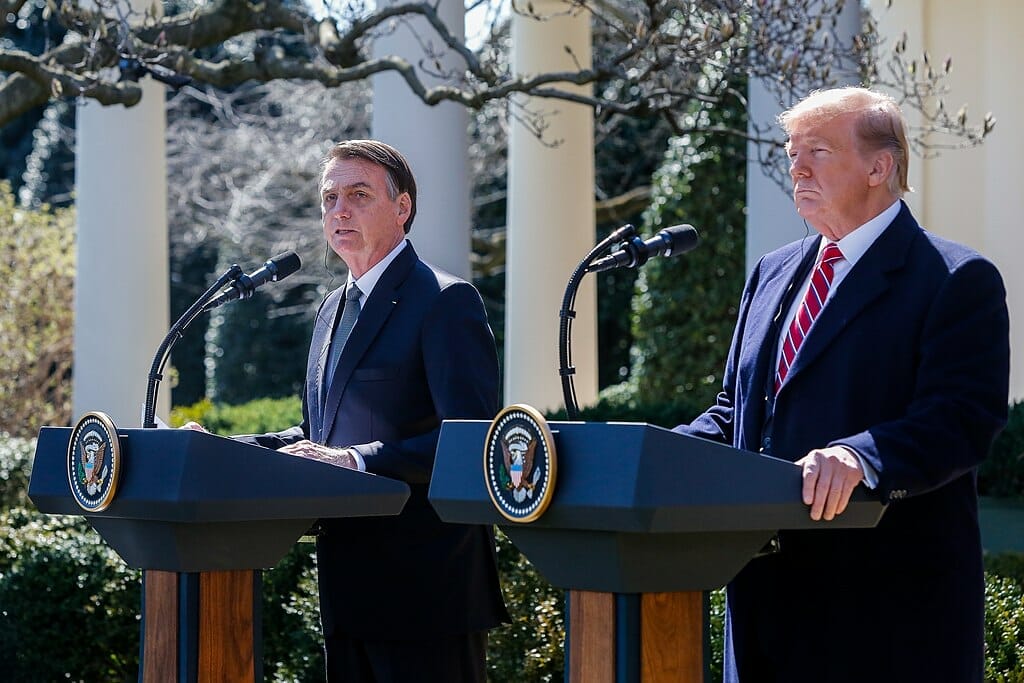In front of the Brazilian Supreme Federal Court sits an iconic statue of Lady Justice by the Italian-Brazilian artist Alfredo Ceschiatti. Rendered in the abstraction of sleek curves and contours, the statue sits blindfolded, a sword in her lap, embodying the swift and impartial administration of the law. But on January 8, as insurrectionists surged toward the Court, having already stormed the Congress and the presidential palace, the Brazilian justice system seemed for two hours as paralyzed and defenseless as its granite emblem who stared down supporters of former President Jair Bolsonaro, unable to lift her sword as rioters defaced her with spray paint.
The attacks were long in the making, a culmination of festering conspiracy theories that Bolsonaro had encouraged his supporters to take up, alleging that the country’s electronic voting system was compromised and that the October 2022 presidential election had been rigged against him. This, they concluded, was the only possible explanation for his narrow loss to the left-wing candidate, former President Luiz Inácio Lula da Silva.
But tensions had been simmering long before the election. Beginning in the immediate aftermath of the January 6, 2021 insurrection in the US, Bolsonaro’s supporters continually threatened to storm the congress and the Supreme Court. For much of this time, of course, Bolsonaro was still in power—there wasn’t yet a “stolen election” to protest. But even so, he and his supporters shared a deep mistrust of the legislative and judicial branches, which they saw as obstacles in the way of their extreme right-wing agenda. Bolsonaro’s son, Congressman Eduardo Bolsonaro—who is close to Steve Banon and regularly attends the meetings of American far-right groups—even suggested during this time that it might be necessary to close Congress and the Supreme Court as in the years following the anti-communist military coup of 1964.

Bolsonaro with US President Donald Trump in White House, Washington, 19 March 2019. Foto: Isac Nóbrega/PR Wikipedia Commons
Still, despite the pervasiveness of the conspiracy theories and Bolsonaro’s relatively strong showing in the election (he lost by less than 2 percent in the second round of voting), the attacks carried out on his behalf proved broadly unpopular with the Brazilian public—an opinion poll conducted three days later found that 93 percent disapproved. This aversion to the attacks soon led Brazilians across the political spectrum to call for a heavy hand in quelling the uproar and reestablishing law and order. Even many of those who ordinarily hold progressive positions on issues of criminal justice have taken to reflexively calling the assailants “terrorists” and “vandals” as well as advocating for harsher and more punitive measures in order to prevent future attacks.
Without a doubt, the coup plotters need to answer for their actions, in which has been the gravest attack to the country’s democratic system since the beginning of the redemocratization process in 1985. But it is equally important that we avoid learning the wrong lessons from such a disturbing attack. In the face of such shocking and traumatizing events, it is understandable that Brazilians may feel receptive to promises of safety and stability in exchange for the sorts of repressive policies that Brazilian conservatives have long espoused: greater discretionary power for the military police, more preventive detentions, longer sentences for the convicted, and more intensive surveillance of individuals and political movements considered potentially dangerous. But sooner or later, such policies will inevitably be turned on progressive social movements. Already, Black movements and environmental advocates in Brazil have faced many of the same charges now levelled at the insurrectionists, including vandalism and even terrorism.
It is a widely recognized phenomenon that in deeply polarized societies, politicians and ordinary people alike tend to favor giving the state broader powers of surveillance and repression when their allies are in control, yet will become deeply fearful of those same powers when their party is in the minority. This has certainly been the case in the US, where the January 6 insurrection in 2021 convinced many progressives to uncritically support measures intended to prevent future attacks, including draconian anti-protest laws.
In Brazil and in the US, we need to avoid learning the wrong lessons from right-wing attacks. It is necessary to abandon the idea that more policing, more surveillance, and more restrictive protest laws can help us to fight right-wing extremism. It is more likely that such measures will soon be used to fight us by the very political actors whom we are fighting against.
Eraldo Souza dos Santos
Eraldo Souza dos Santos is a philosopher of political thought with research interests in the politics of social movements. He is currently a PhD candidate at Panthéon-Sorbonne University.
Banner: Justiça cega Praça dos três poderes (Lady Justice). Wikipedia Commons

